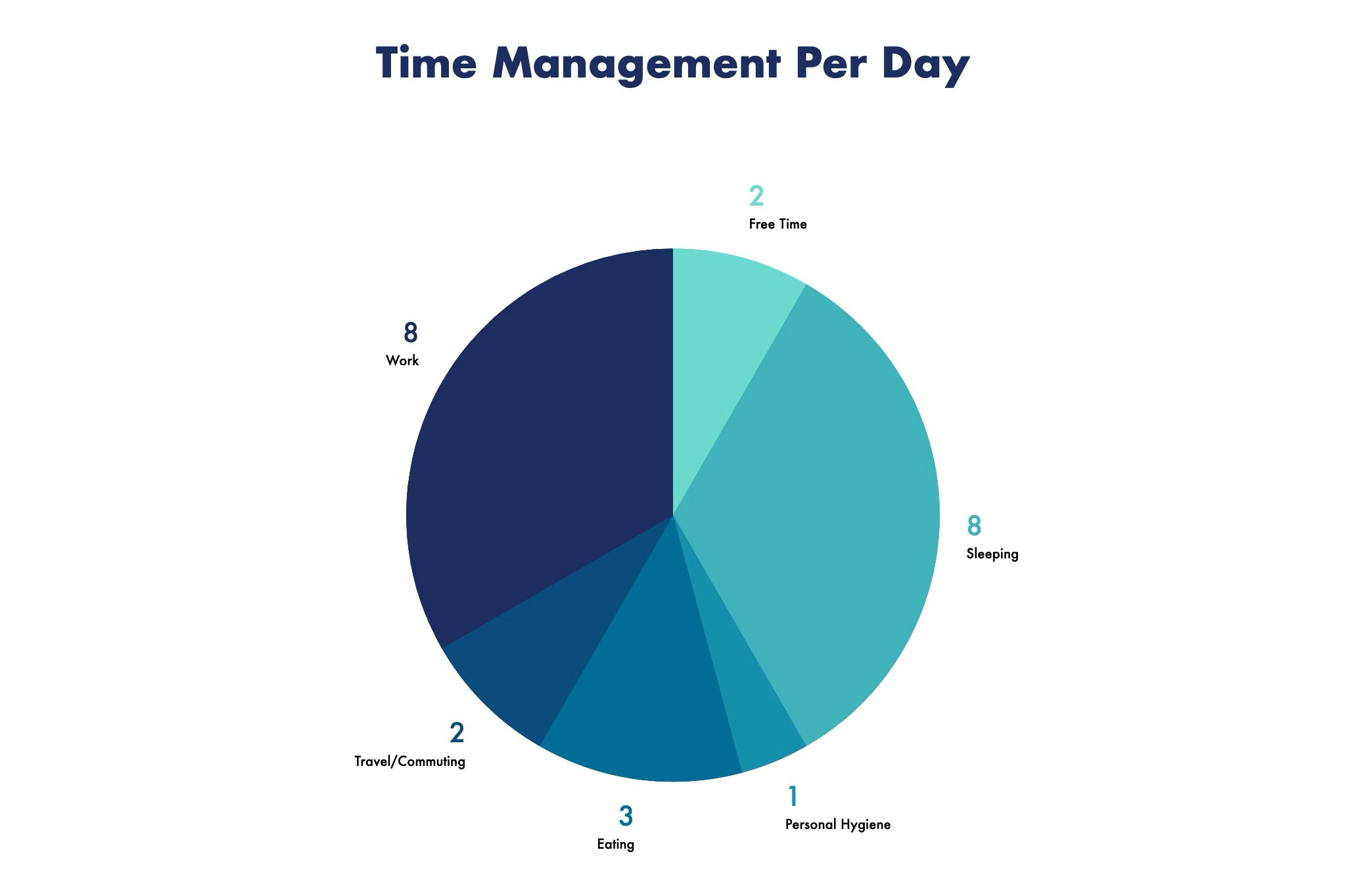The Importance of Time Management
Time is our most valuable resource. Because it is finite we must learn to manage time and make the most out of what we are given.

A master in the art of living draws no sharp distinction between work and play, labor and leisure, mind and body, education and recreation. He hardly knows which is which. He simply pursues his vision through whatever he is doing and leaves others to determine whether he is working or playing. To himself he always seems to be doing both.
How Does One do this? It helps to be a Master of Time Management.
What Is Time?
Voltaire, the French writer-philosopher, asked an interesting question in his book Zadig or the Book of Fate: “What, of all things in the world, is the longest and the shortest, the swiftest and the slowest, the most divisible and the most extended, the most neglected and the most regretted, without which nothing can be done, which devours all that is little and enlivens all that is great?”
To this, Zadig answered, “Time.” Then he said, “Nothing is larger, since it is the length of eternity; nothing is shorter, since there is never enough of it to satisfy our wants. Nothing is faster for the person who is happy; nothing is slower for one who is sad. In smallness, time is infinitely divisible; in greatness, time has no limit. People neglect time, but they regret the loss of it. There is no action that can be done without time. Time stores in darkness whatever is unworthy, and makes immortal all that is truly great.”
Benjamin Franklin once said, “Dost thou love life? Then do not squander time, for it is the stuff that life is made of.” If you waste your time, you waste your life. If you master time, you master your life. For what purpose should time be used?
Take Time
Take time to think,
it is the source of power.
Take time to play,
it is the secret of youth.
Take the time to read,
it is the basis of knowledge.
Take time to love,
it is the essence of life.
Take time for friends,
it is the road to happiness.
Take time to laugh,
it is the music of the soul.
Take time to give,
it is too short to be selfish.
Take time to work,
it is the price of success.
Everyone’s Biggest Problem
Time is both personal and finite. It is personal in that the best statement of who you are is the way you spend your time. Your use of time reflects your needs, goals, and personality as does no other single thing. Time is finite in that each person has only 24 hours in a day, 168 hours a week, and 8,760 hours a year. The following figure shows how most people spend their time each day.
How You Spend Your Time

On average, this schedule leaves about 2 hours each day to do all of the other things that make life worth living. However, most people, by their own accounts, waste at least two hours a day. We have to ask, for what did we exchange our 2 hours? Did we just put the time in, or did we take steps toward our goals in life?
The Importance of Attitude
For fifty years, William Stewart taught an attitude toward time and life that will help you get the most out of both:
Just for Today…
Just for today, I will try to live through this day only and not tackle all of my life’s problems at once. I hope I can do something for someone and keep the memory of it for a lifetime.
Just for today, I will try to be happy. This assumes to be true what Abraham Lincoln once said: “Most folks are as happy as they make their minds up to be.”
Just for today, I will adjust myself to what is and try not to adjust everything to my own desires. I will take my “chances” as they come and fit myself to them.
Just for today, I will exercise myself in two ways: I will do somebody a good turn and not get found out. I will do at least two things I don’t want to do just because they are good for me.
Just for today, I will be agreeable. I will look as fit as I can, talk softly, listen intently, act courteously, criticize not one bit, try not to find fault, and try to regulate no one except myself.
Just for today, I will have a program. I may not follow it exactly, but I will have it. I will try hard to save myself from two pests—hurry and indecision.
Just for today, I will have a quiet moment or two all by myself and relax. During this brief period, somehow, I will try to better myself and try to get a better perspective of my life.
Just for today, I will be unafraid to enjoy what is beautiful and what is common and to believe that as I give to the world and the people in it, so will the world benefit.
Time Management Principles
You will know you have mastered time management when you can sit quietly for at least 2 or 3 hours during your week to think about your life, your work, and your personal effectiveness.
The following are twelve principles for effective time management:
- Set Goals. Good time management begins with goals—knowing what you want to accomplish
- Set Priorities. When opportunities exceed resources, choices must be made. Nowhere is this more apparent than in the use of time. Use the ABC method to determine priorities:
- Priority A—Must do. These are vital goals and tasks; do these first.
- Priority B—Should do. Goals and tasks in this category are important but are not essential; do these second.
- Priority C— Could do. While interesting, these goals and tasks can be postponed; do these third.
- Use a Daily To-Do List. Write down the tasks you want to accomplish each day, and rank these in order of importance. The small amount of time you invest in doing this will repay you many times over. Make sure your to-do list is on a paper, notebook, or electronic device small enough to carry with you wherever you go.
- Know Your Values. Nothing is more stressful than being hard-working and efficient on tasks that have nothing to do with your value system. For every task, ask yourself, “Does this support what is really important to me?” The sequence is to identify your values, set goals, and use a prioritized to-do list as a productivity tool.
- Stay Aligned. When your daily behavior is aligned with your goals, and these goals support your values, you will experience a sense of control and personal integrity.
- Make Good Use of Waiting Time. In our complex and interdependent world we often run into delays—at the repair shop, in the bank, or at the airport. Be prepared to use this time productively. Reading, writing, thinking, talking, resting, and exercising are all preferable to wasting time.
- Learn How to Say No. If saying “yes” helps accomplish important goals, by all means do so. But if saying “yes” prevents you from accomplishing more important tasks, learn to say “no” in a tactful way.
- Focus Your Efforts. Mistakes can result from trying to do too many things at once. Often, it is not the quantity of time spent on a project that counts but the quality of time. By slowing down and concentrating on the task at hand, performance can improve.
- Perform Undesirable Tasks When Your Energy is High. I once asked Tibor Greenwalt, a medal of honor recipient and a leader in medical research, “What has been the secret to your success?” He thought for a moment, and with a smile, he said, “I always do what I hate to do first. Then, when I turn to what I love, I have a tremendous burst of energy. When I’m doing what I love, the work itself keeps me going.”
- Plan for Emergencies. Keep your car in good repair and keep extra keys in your wallet. Get up 15 minutes early. Do homework and other important tasks as soon as possible; don’t wait until the last minute.
- Just Do It. Procrastination is a thief. Ultimately, action is required. The good time manager asks, “What is the best use of my time right now?” and then seizes the moment. As Ben Franklin once wrote, “Well done is better than well said.”
- Embrace Time Management. Some people resist time management practices, but no other tool has as much potential for improving performance and managing stress.
E-World Note
An “always-on” work culture has many people spending 8 to 12 hours a day in front of a screen, 3 hours on Facebook, and the expectation of 24/7 availability. Overuse of digital devices can lead to burnout, sleeplessness, and relationship problems. Professor Susan Wehrspann provides a time management solution: In the context of your work culture, consciously decide when to work and when not to work. Someone may decide to work two hours in the evening but switch off between 3 and 5 pm when they pick up children and cook dinner; or decide to work two hours in the morning before they arrive at the office.
Beating the Clock
Time management expert Nina Tassi knows a lot about time management. The picture she paints of people who are at ease with time is instructive and motivating.
Seven Key Traits of People Who Are at Ease with Time
- They never seem to be in a hurry. Even their body language is graceful and purposeful, not jerky and rushed.
- They experience the present to the fullest, having the capacity to focus on the moment at hand, both in work and in play.
- They take time to preserve their physical health, emotional well-being, and—importantly—their creative resources.
- They set priorities and then work the list, which allows them to accomplish more than most other people.
- They learn from experience and never harbor guilt, regret, or blame.
- They spend time on relationships. They love to teach and learn from others as well as care and be cared for.
- They live value-based lives, making sure their actions support what is truly important to them.
Masters in the art of living follow simple principles of effective time management to live happy and productive lives with ease and grace.
Answer this six-word question every morning: “What is important to do today?” Answer this six-word question every evening: “What good did I do today?”
For related learning, read:
First Things First by Stephen Covey
How to Get Control of Your Time and Your Life by Alan Lakein
For related learning, watch:
“Put The First Things First” by Stephen Covey
“Jar of Life—Put Important Things First”
